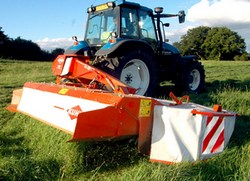Silage: Be on the lookout for soil contamination

Anyone tempted to make silage in the next few weeks needs to be aware of the possible risks of soil contaminating crops, according to David Davies of IGER.
Speaking to Farmers Weekly at this week’s rain-affected Royal Welsh Show, Dr Davies said with crops likely to be lodged and some crops cut and laying on wet ground, the risk of soil being ensiled alongside forage was high.
“The risks are manyfold. First, fields are sodden and traffic on them is likely to mean soil will rise up into crops as they are baled or chopped. Second, tractors are likely to carry large amounts of soil back to clamps and yards. Where this happens, it may well be worthwhile wasting some grass at clamp faces and in gateways to clean wheels.
“Last, farmers need to avoid picking up soil on round bales left in fields for any period of time.” Where possible, increase cut height to help keep crops up off waterlogged soils, explained Dr Davies.

As an alternative he said it may be possible to load bales at the field side, minimising tractor movements on sodden ground. “Round baling should mean fewer, lighter movements than clamping, so may be the preferable option.”
When harvested, he warned that acid inoculants could be the best option as this would help minimise spoilage caused by contamination. “Other inoculants will struggle to cope with the level of contamination we are likely to see this year.”
Wet weather will have lodged many crops, leaving 15cm (6in) of rotting grass in the bottom of swards. Once lodged, the crop bulks rapidly and digestibility is lost, said James Brinicombe of Dennis Brinicombe Feeds.
“Lodged grass means lower cutting and more soil contamination. No amount of turning, even under ideal conditions, will improve the quality of the final conserved crop.”
Looking to grazing conditions, Dr Davies said it may be necessary to bring cows in off fields. “But this will mean eating into winter feed stocks, so should only be done when entirely necessary.”
Everything should be done to make the most of grazed grass even when that means installing temporary tracks, he added. “However, farmers should avoid poaching fields too much as, should we have a good autumn, these fields may well provide an opportunity to extend the grazing season.”
Poached fields are likely to need a full reseed, explained Dr Davies. “But even for this, it will be a case of ensuring fields can take traffic before starting work. Compaction is likely to be a real issue and care should be taken not to do more damage.”
